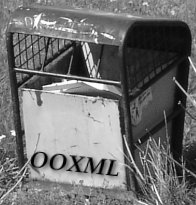

In a taped address for the Idlelo 3 conference, Fraser-Moleketi said that “open standards are a critical factor in building interoperable systems that are important to governments … In South African we have a document - the minimum interoperability standards - which includes the use of open document format or ODF.”
Fraser-Moleketi pointed out that ODF was adopted as an ISO standard in 2006. She said that it was “unfortunate that the leading vendor of proprietary office software, which enjoys considerable dominance in the market, chose not to participate and support ODF in its products but rather to develop its own competing document standard, which is now also awaiting judgement in the ISO process.
As we move into the last 10 days before the final chance for national standards bodies to change their JTC1 ballot on Microsoft’s OOXML specification expires, there are key questions that the bodies and the people who participate in them need to answer. Some are straightforward and some are controversial.
But all this debate around multiple standards is somewhat of a distraction from the real issue at hand. In the end what is really being asked to National Bodies (NB) around the world isn’t to choose between ODF and OOXML, or to choose between ODF alone and ODF and OOXML. The question that NBs are asked to answer is whether OOXML deserves to become an ISO standard in its own right.
The reality is that if the OOXML specification wasn’t of such a poor quality it most certainly would have had a much easier ride through the Fast Track process. If all that could be argued against it was that it was too big, the IP license has gaps, and multiple standards aren’t good, this may not even have made headlines, no matter how true it is.
[...]
OOXML must be voted down simply because it is a bad standard.
 How bad is it? Have another look (post from yesterday). OOXML is full of unaddressable defects, making it s good candidate for the wastebasket, not for ISO.
How bad is it? Have another look (post from yesterday). OOXML is full of unaddressable defects, making it s good candidate for the wastebasket, not for ISO.
ISO must not feed each and every person who uses an open suite out of the garbage can. If standards bodies are permitted to give a go-ahead to OOXML, that's just what's likely to happen in more places. Vote "No" to OOXML until/unless its quality is raised above that of a spurious rough draft, which includes implicit legal threats against choice. ⬆